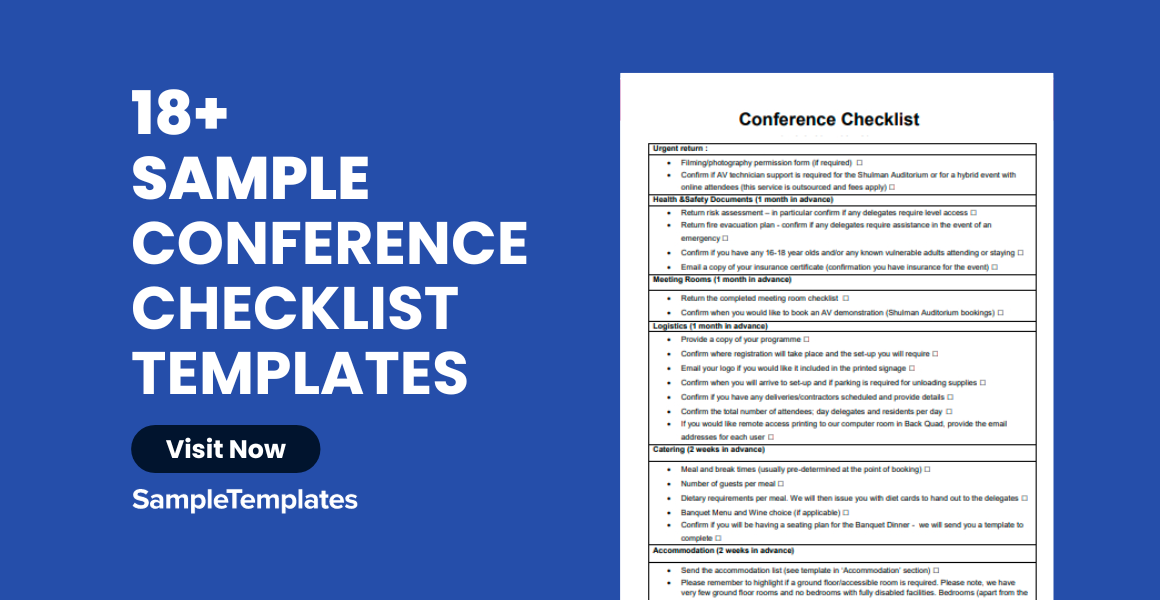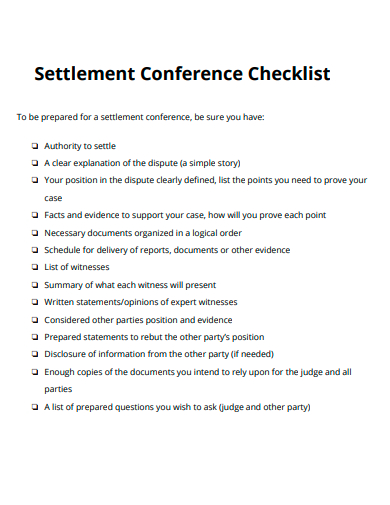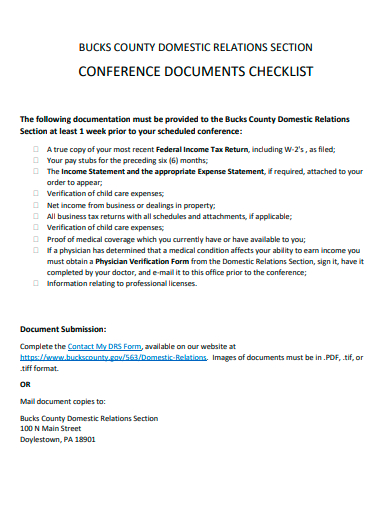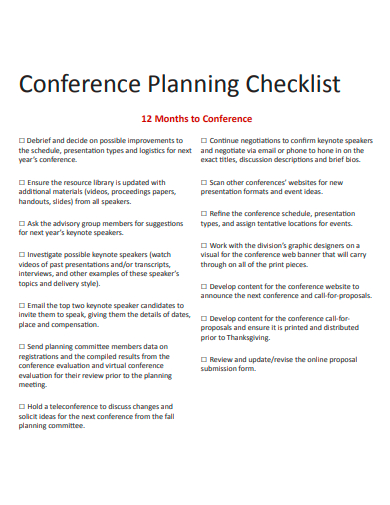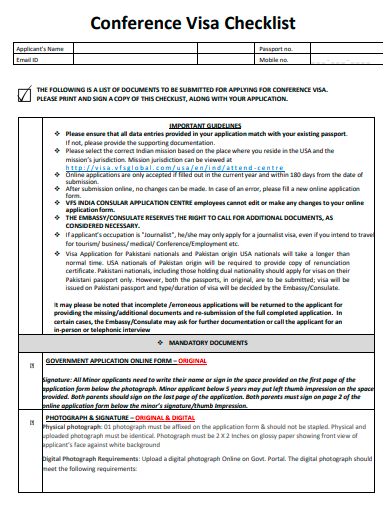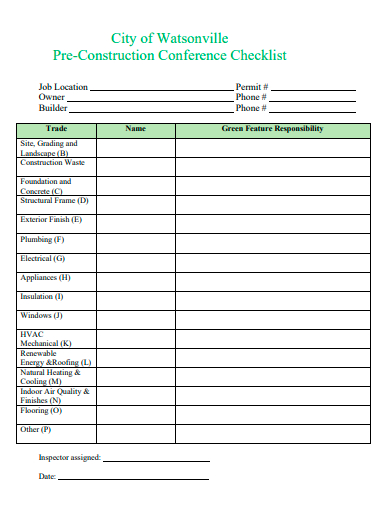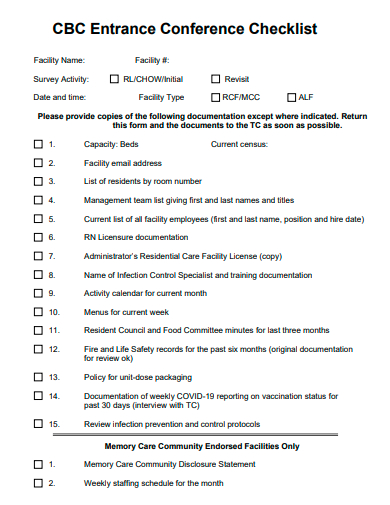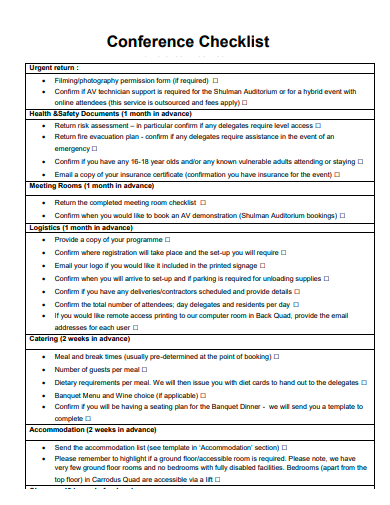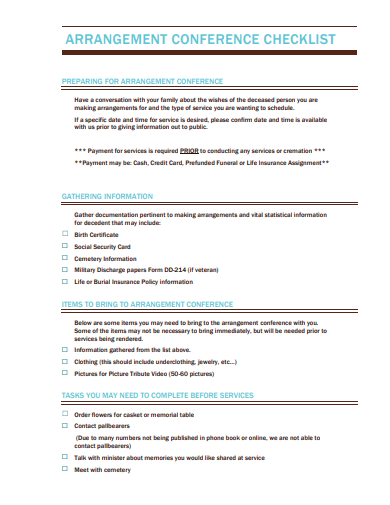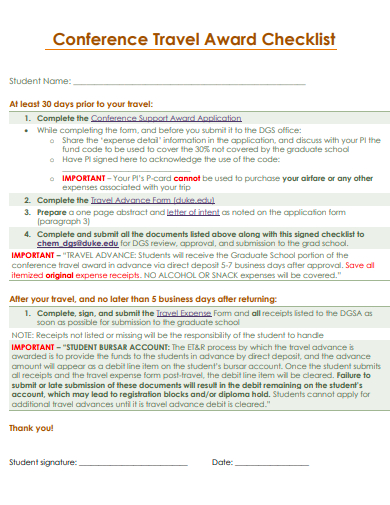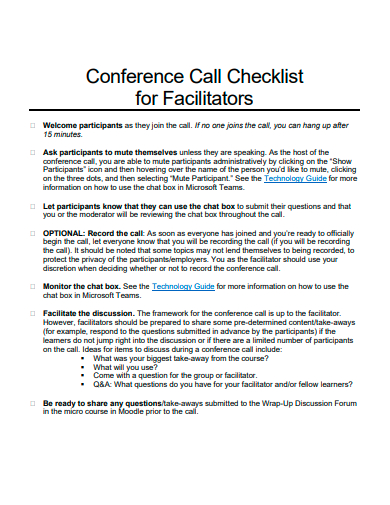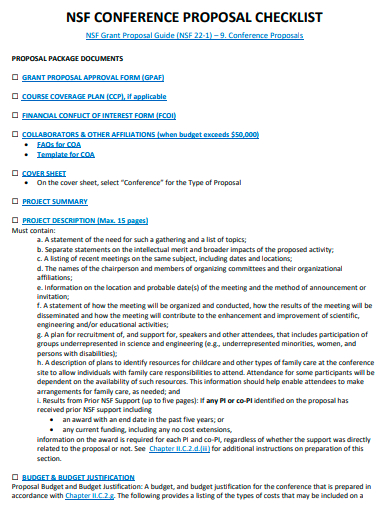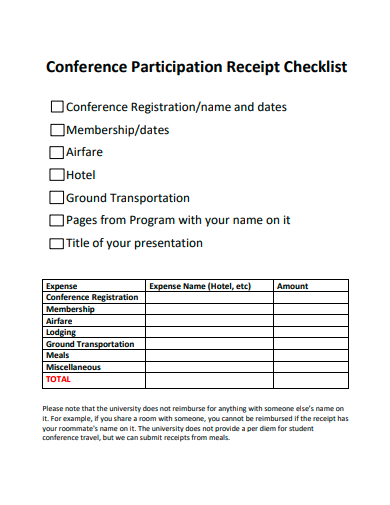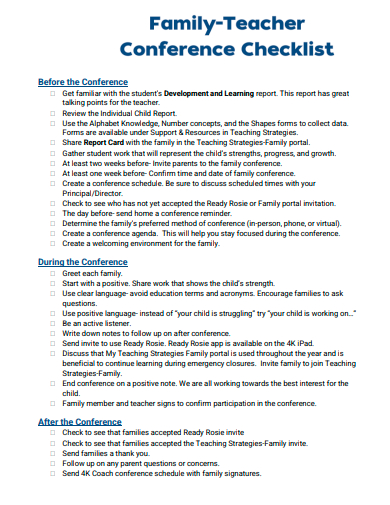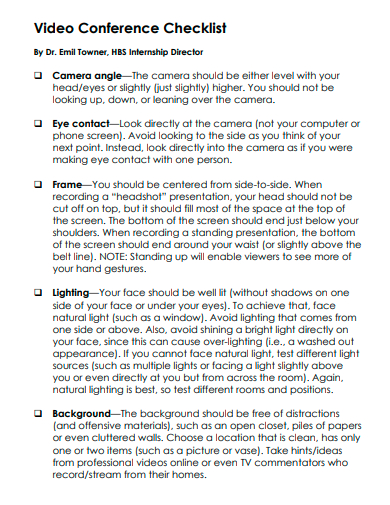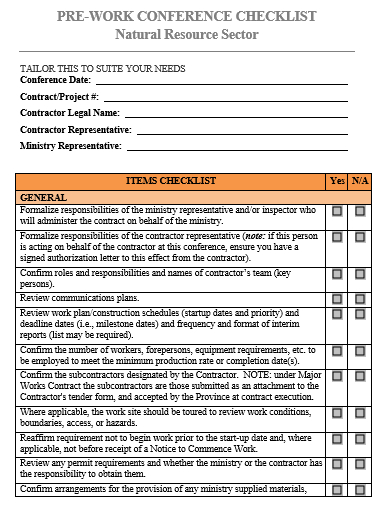Organizing a successful conference requires meticulous strategic planning and attention to detail. Our ‘Conference Checklist’ serves as your essential guide, ensuring you cover every critical aspect from venue selection to post-event feedback. Perfect for first-time organizers or seasoned professionals, this sample checklist ensures nothing is overlooked. Maximize the impact of your event, drive engagement, and leave a lasting impression on attendees by incorporating these tried-and-tested strategies. Dive in and ensure your conference is both memorable and flawless.
18+ Conference Checklist Samples
1. Sample Checklist Template
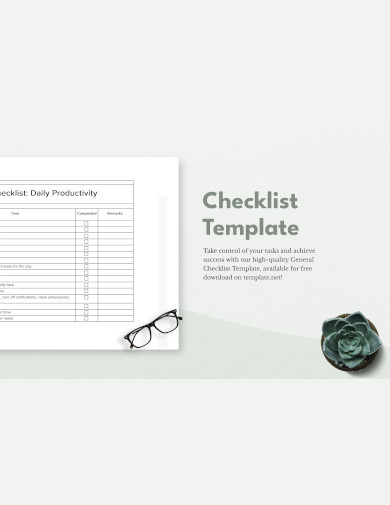
2. Basic Checklist Template
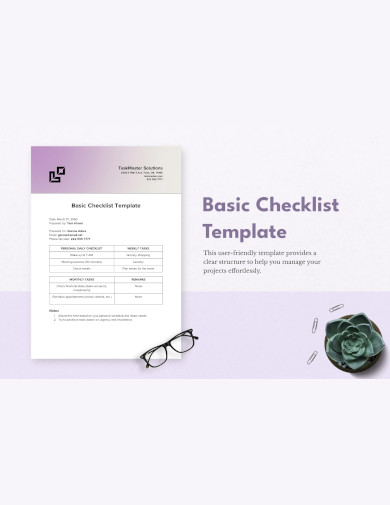
3. Formal Checklist Template
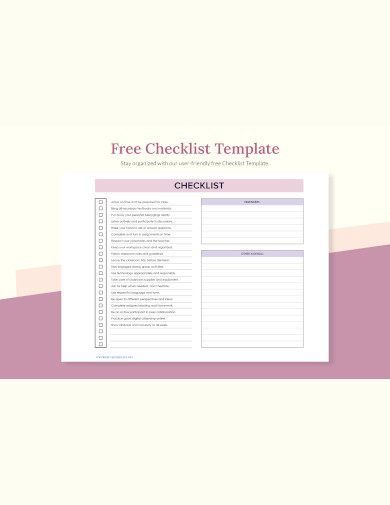
4. Printable Checklist Template
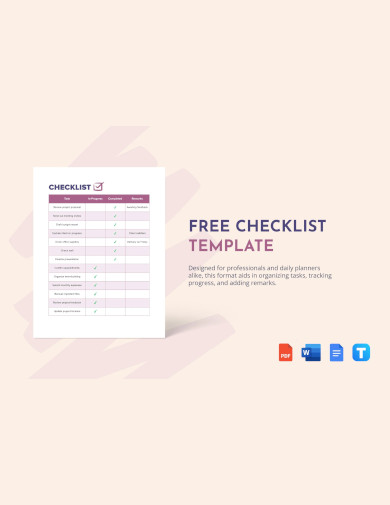
5. Sample Settlement Conference Checklist Template
What is a Conference Checklist?
A conference checklist is a detailed sample list of tasks and considerations used by organizers to plan, manage, and execute a conference effectively, ensuring that all aspects of the event, from venue selection to post-conference activities, are covered.
Understanding the Need for a Conference Checklist
A conference checklist serves as a sample roadmap for organizers. It provides a clear overview of tasks, timelines, and resources required. Not only does it assist in planning and logistics, but it also instills a sense of confidence, ensuring that the event will run smoothly.
1. Preliminary Planning
- Defining Objectives: Understand the purpose of your conference. Is it academic, business-oriented, or for training? Clear objectives will guide subsequent decisions.
- Budget Allocation: Determine the total budget available, including sources of funding and areas of expenditure.
- Selecting a Date: Choose a suitable date, ensuring there are no clashes with other significant sample events in your industry.
- Forming a Team: Assemble a team with clear roles, such as finance, marketing, logistics, and content.
2. Venue and Logistics
- Venue Selection: Decide on a venue that aligns with your sample budget, space requirements, and ambiance. Ensure it’s accessible to attendees and has adequate facilities.
- Accommodation: If attendees are traveling from afar, consider their lodging requirements. Partnering with nearby hotels can often yield discounted rates.
- Technical Requirements: Ensure the venue has the necessary audio-visual equipment, Wi-Fi capabilities, and other technical requirements.
3. Content and Programming
- Speakers and Panels: Identify and invite keynote speakers, panelists, and session leaders. Confirm their availability and any logistical needs.
- Scheduling: Design a timetable for the conference, allotting time for speeches, breaks, networking sessions, and workshops.
- Materials: Prepare any sample handouts, presentation slides, or other materials required for sessions.
4. Marketing and Registrations
- Branding: Create a recognizable brand for your conference, including a logo, theme, and color scheme.
- Promotion: Use various channels, like email, social media, and partnerships, to publicize the event.
- Registration: Set up an online registration platform, decide on ticket pricing tiers, and track attendee numbers.
5. On-the-Day Logistics
- Signage: Ensure that adequate signage is in place to guide attendees through the venue.
- Check-In: Organize a smooth check-in process, possibly employing digital solutions like QR codes or apps.
- Emergency Procedures: Be prepared for unforeseen circumstances. Have first aid facilities and familiarize yourself with the venue’s evacuation procedures.
6. Post-Conference Activities
- Feedback: Gather a sample feedback from attendees to understand what went well and areas for improvement.
- Documentation: Document the event through photographs, videos, and written summaries. This not only serves as a record but can be useful for promotional activities for future events.
- Acknowledgments: Thank your team, speakers, sponsors, and attendees. Their contributions are vital for the success of the event.
Types of Conference Checklist:
A conference checklist can be categorized based on various stages of planning, execution, and post-conference activities. Here are some of the different types of conference checklists, tailored to specific aspects of the event management process:
1. Attendee Experience Checklist
- Registration Desk: Organize a smooth check-in process with name tags, conference materials, and swag.
- Networking Spaces: Designate areas or sessions for attendees to network.
- Feedback Collection: Provide means (digital or paper) for attendees to give feedback.
2. Emergency Preparedness Checklist
- Medical Provisions: Set up a first-aid station and have medical contacts on hand.
- Security Measures: Detail security protocols, from attendee screening to emergency evacuations.
- Backup Solutions: Plan for unexpected issues like power failures or equipment malfunctions.
3. Post-Conference Evaluation Checklist
- Feedback Analysis: Compile and analyze feedback to gauge the conference’s success and areas of improvement.
- Financial Reconciliation: Compare the budgeted vs. actual expenses.
- Thank You Outreach: Send appreciation sample notes or emails to attendees, sponsors, speakers, and volunteers.
4. Virtual Conference Checklist
- Platform Selection: Choose a reliable and interactive virtual event platform.
- Tech Support: Ensure attendees have guidance on accessing and navigating the virtual space.
- Session Recording: Plan to record sessions for post-conference access or distribution.
Implementing the Conference Checklist
The key to effectively utilizing a conference checklist is regular review and updates. As the event draws nearer, some tasks will need weekly, if not daily, attention. Also, every conference is unique, so while this printable checklist provides a comprehensive overview, it should be tailored to the specifics of each event.
6. Sample Conference Documents Checklist Template
7. Sample Conference Planning Checklist Template
8. Sample Conference Visa Checklist Template
9. Sample Pre-Construction Conference Checklist Template
10. Sample Entrance Conference Checklist Template
11. Sample Conference Checklist Template
12. Sample Arrangement Conference Checklist Template
13. Sample Conference Travel Award Checklist Template
14. Sample Facilitators Conference Call Checklist Template
15. Sample Conference Proposal Checklist Template
16. Sample Conference Participation Receipt Checklist
17. Sample Family Teacher Conference Checklist Template
18. Sample Video Conference Checklist Template
19. Sample Pre-Work Conference Checklist Template
How do you Create a Conference Checklist?
Organizing a successful conference requires meticulous sample planning and attention to detail. From securing the venue to arranging for speakers, a conference checklist ensures that you don’t miss a step. Here’s a comprehensive guide to creating a foolproof conference checklist.
Step 1: Define the Conference’s Purpose and Objectives
Start by establishing a clear purpose for your conference. Are you aiming to educate, network, or perhaps launch a product? Once the purpose is defined, set specific objectives you hope to achieve. This could range from attracting a certain number of attendees to achieving specific feedback scores.
Step 2: Budgeting and Funding
Every conference operates within a budget. Create a detailed budget plan that covers everything from venue rental to promotional materials. Identify potential sources of funding, which could include ticket sales, sponsorships, or grants. Make sure to allocate funds for unforeseen expenses.
Step 3: Logistics and Planning
This step encompasses several critical elements:
- Venue Selection: Find a location that aligns with your conference’s size, sample objectives, and budget. Consider factors like accessibility, available facilities, and ambiance.
- Date and Time: Choose a date that doesn’t clash with major events or holidays. Also, consider the convenience of your target audience.
- Speakers and Content: Identify and invite speakers who resonate with your theme and audience. Arrange a mix of keynotes, workshops, and interactive sessions to keep the simple agenda engaging.
- Technology and Equipment: Depending on the nature of the conference, you might need projectors, microphones, Wi-Fi access, and even virtual conference platforms for remote attendees.
Step 4: Promotion and Registration
Your conference’s success largely depends on its visibility:
- Marketing and Promotion: Leverage various channels like social media, email campaigns, and partnerships to promote your event. Early bird discounts or promotional rates can entice potential attendees.
- Registration: Set up an easy-to-use registration system. This can be done using online platforms or apps specifically designed for event management. Ensure you collect relevant data to help cater to the attendees’ needs, but also respect privacy regulations.
Step 5: Execution and Feedback
- On-the-Day Logistics: On the day of the conference, have a dedicated team to manage registrations, guide attendees, and handle any unforeseen challenges. Ensure that there’s a contingency plan in place for potential hiccups.
- Feedback: Once the conference concludes, collect feedback from attendees. This can be done through physical forms, online sample surveys, or interactive sessions. This feedback is crucial for making improvements in future events.
In Conclusion, a conference checklist is not just a list but a strategic tool. It ensures that an event is meticulously planned and executed, promising a memorable experience for all attendees. For organizers, it offers peace of mind, knowing that every detail, from the significant components down to the minutiae, has been considered and accounted for.
Related Posts
FREE 17+ Survey Checklist Samples in MS Word | Google Docs | PDF
FREE 18+ Internship Checklist Samples in MS Word | Google Docs | PDF
FREE 18+ Statement Checklist Samples in MS Word | Google Sheets | PDF
FREE 20+ Voluntary Checklist Samples in MS Word | Google Sheets | PDF
FREE 18+ Summary Checklist Samples in MS Word | Google Sheets | PDF
FREE 14+ Sponsorship Checklist Samples in MS Word | MS Excel | PDF
FREE 17+ Lesson Checklist Samples in MS Word | Google Sheets | PDF
FREE 18+ Progress Checklist Samples in MS Word | Google Docs | PDF
FREE 18+ Enrollment Checklist Samples in MS Word | Google Docs | PDF
FREE 18+ Graduation Checklist Samples in MS Word | Google Sheets | PDF
FREE 15+ Consent Checklist Samples in MS Word | Google Sheets | PDF
FREE 18+ Review Checklist Samples in MS Word | Apple Pages | PDF
FREE 18+ Submission Checklist Samples in MS Word | Google Docs | PDF
FREE 18+ Request Checklist Samples in MS Word | MS Excel | PDF
FREE 21+ Faculty Checklist Samples in MS Word | Google Sheets | PDF
